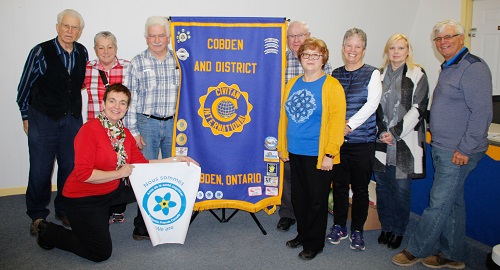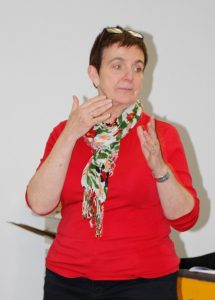
WHITEWATER REGION — Whitewater Region is looking to the future and becoming a Dementia Friendly Community.
Linda LeDuc, a Dementia Friendly Communities Trainer with Alzheimer Society of Ontario, was the guest speaker at a meeting hosted by the Cobden and District Civitan Club last Thursday afternoon.
She provided an educational information session on what a Dementia Friendly Community (DFC) is. It’s a community that has people who understands the disease, assists people they feel may have the disease while they are out and about in the community and values the safety of people. It also means the community is catering to a large and growing part of the population; be accessible for people with all types of abilities and demonstrates the community’s commitment to being inclusive.

“Dementia is a shift in the way a person experiences the world around them,” Ms. LeDuc said.
For example, if you were to see someone on the street, who doesn’t seem too sure of their surroundings, or where they are, people are encouraged to walk up to them, preferably from the front, and ask if they need assistance.
A person who may have dementia may show signs, such as, inappropriately dressed for the weather; standing still, looking around for a long period of time; pacing; looking confused or disoriented; and repeating the same question and statement within a short period of time.
Ms. LeDuc provided statistics regarding people with dementia. Dementia can be diagnosed in people who are as young as 30. There are currently 564,000 Canadians living with dementia, including Alzheimer disease, she noted. Sixty-five percent of women over 65 years old have dementia.
In less than 15 years, it’s expected there will be 937,000 Canadian who will have dementia and once you reach 65 years old, your risk for dementia doubles every five years.
She noted people with dementia have the same rights as others: to live well, be treated with dignity and respect and maximize autonomy.
“We can support abilities rather than emphasize the symptoms,” Ms. LeDuc said.
Dementia is a progressive set of symptoms that can include loss of memory, difficulties thinking, challenges with languages, problem solving or visio-spatial function.
“These symptoms will reduce a person’s autonomy,” she stressed.
Ms. LeDuc said there is no single test to get a diagnosis of dementia.
“Getting a diagnosis may involve medical history, mental status exam, laboratory tests, neuropsychological evaluations and a physical exam,” she said. “Getting diagnosed will rule out other diseases, help you plan for the future and means a treatment plan can be created.”
Ms. Leduc provided 10 warning signs and strategies to deal with someone with dementia/alzheimers.
Memory loss that affects day-to-day abilities – forgetting things or struggling to retain new information.
Difficulty performing familiar tasks – forgetting how to do something you’ve been doing your whole life, such as preparing a meal or getting dressed.
Problems with language – forgetting words or substituting words that don’t fit the content.
Disorientation in time and space – not knowing what day of the week it is or getting lost in a familiar place.
Impaired judgement – not recognizing a medical problem that needs attention or wearing light clothing on a cold day.
Problems with abstract thinking – having difficulty balancing a chequebook, for example, or not understanding what numbers are and how they are used.
Misplacing things – putting things in strange places, like a dress in the refrigerator or a wristwatch in the sugar bowl.
Changes in mood and behaviour – exhibiting severe mood swings from being easy-going to quick-tempered.
Changes in personality – behaving out of character, such as becoming confused, suspicious or fearful.
Loss of initiative – losing interest in friends, family, and favourite activities.
Ms. LeDuc noted there are three steps to providing assistance to a person with dementia: enhance communication – say exactly what you mean; offer appropriate help and support the person’s reality.
When you are dealing with a person with dementia, there is a way of enhancing the environment, Ms. LeDuc said. Ensure the room is free of noise or excessive clutter and distractions; ensure it’s well lit; make sure the seating allows for eye contact; make sure office signage is large and clear; ensure carpets and pathways are clear and have a quiet room available, where that person can go and relax. It’s also important to realize that a person may not realize it is themselves they are seeing in mirrors.
It’s important to support the person’s reality, she said.
“Offer reassurances,” Ms. LeDuc said. “Do not correct and focus on what they need or are trying to say.”
There is also an easy way of knowing when someone has dementia .. and that’s if they are wearing a blue medic alert bracelet, she said.
For more information, or if you would like to host a Community Friendly Dementia workshop, please call Ms. LeDuc, 613-729-4259
Ending her presentation, Ms. LeDuc said, “A person with dementia, experience is always either enhanced or diminished by how we choose to relate to them.”






![Kenopic/Smith Auction [Paid Ad]](https://whitewaternews.ca/wp-content/uploads/2018/10/advertising-100x75.jpeg)

